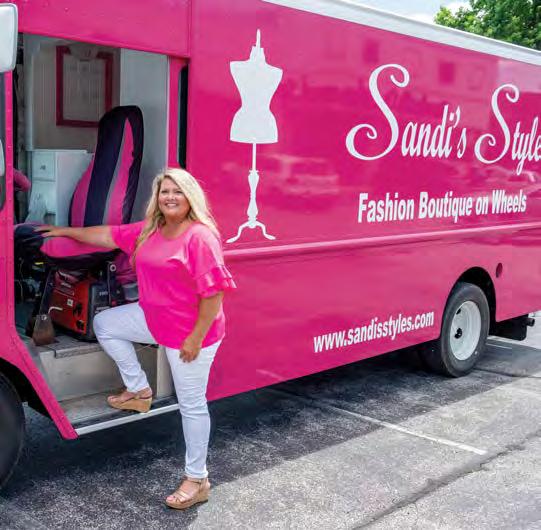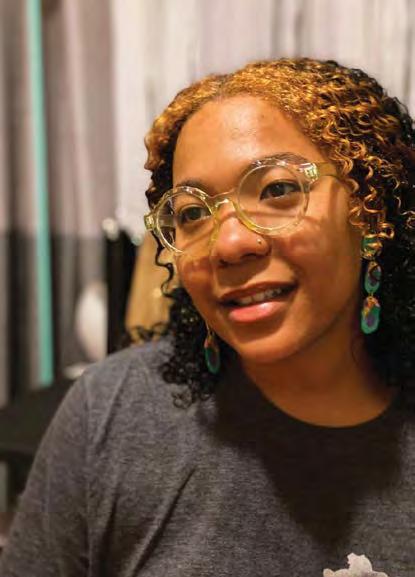
5 minute read
Business owners keep moving forward
By Carrie Vittitoe Photos by Melissa Donald
Being a business owner can be risky and stressful, but being a business owner during a pandemic brings a whole new set of challenges. For many female entrepreneurs, COVID-19 has been a season of stopping, pivoting, and trying to move forward despite uncertainty and fear.
THE BENEFITS OF DIVERSIFICATION
Wealth management advisors typically urge their clients to be diverse in how they invest so that they don’t have all their eggs in one proverbial basket. Jesika Young, president and CEO of Cimtech in New Albany, Indiana, a precision machine fabricator and assembly/sub-assembly manufacturer, knows just how important diversification is. “We make hundreds of thousands of component parts for a wide array of industries — food and beverage to hospitality to automotive to rail, medical, you name it,” she says.
When the automotive industry shut down completely in response to COVID-19, it had an impact on a wide range of companies that supply parts and components, including Cimtech, but being a manufacturer of diverse components gave the company wiggle room. “Luckily, because of how diverse we were, we were able to adapt and take on some additional work,” Young says. Because Cimtech also does design engineering, there are opportunities due to the economy restarting and how life in a post-COVID has changed. “There are going to be needs for things that haven’t been invented yet,” she says.
In the midst of uncertainty, Jesika and her colleagues tried to keep what they could control at the front of mind. “We can’t control what our supply chain does; we can’t control what our customers are going to do and how they’ll react. We can control the safety of our team, the quality of our product, and that we’re still delivering the way that we always have to our customers and partners,” she says.
As a manufacturer, safety has always been a top priority, but COVID-19 has made it an even greater one for the future. “All of the protocols [hand sanitization, disinfection of every office, no tool sharing, and very strict visitation policy] that we have put into place will remain,” Jesika says. While Cimtech staff has been able to still have meetings with clients who are across the country using Zoom and other tools, Jesika says she misses the face-to-face meetings and hopes they will be able to begin again soon.
THE NECESSITY OF AN ONLINE PRESENCE
Businesses that didn’t have an online presence before the pandemic have had to weather more stress, while savvy retailers who regularly used social media prior to COVID-19 have been able to use it to their advantage, keeping customers apprised of what is for sale, the cost, and curbside pickup procedures.
Sandi West, owner of Sandi’s Styles in Middletown, which is a women’s fashion storefront, mobile pink truck, and online shop, has felt the economic hardship of COVID-19. April is typically her biggest month of the year, and much of her inventory is geared toward graduations, Derby, and vacation wear, all of which were canceled or postponed.
Although her shop had a presence on Instagram and Facebook as well as a VIP group for loyal customers, she says she didn’t feel comfortable pushing products the first several weeks of quarantining. “Everybody was in a crisis situation; you’re trying to protect your families and yourself so I figured that was everybody’s priority,” she says.
Many of Sandi’s suppliers in Los Angeles, California, began making masks from fabric remnants of dresses and tops that Sandi sells. “I started selling those and was able to pay my rent,” she says. She has done curbside pickup and offered free shipping to boost business, but because she is in the high-risk health category for COVID-19 infection, she has been hesitant to re-open the shop to customers.
Sandi’s involvement with professional organizations for boutique owners helped her realize, even before COVID-19, that an online presence is an absolute necessity. Malls and brickand-mortar shops are simply not what they used to be in terms of generating traffic. While her business has been closed to in-person shopping, Sandi has used this time to take a class on Facebook advertising in order to better use the technology to market to potential clients.
“[The pandemic] forced me to renew my webpage and enter the online selling market, which was a must anyway,” says Dori Lewis, owner of Polkadotted Pineapple Boutique, a consignment shop in Shelbyville, Kentucky. “I had someone working on it, and it was a good thing it was up and running.” She says making that abrupt pivot to online sales was difficult, but “when you have no other avenue to generate business, you have to do something.”
UTILIZE THE RESOURCES

Robert Coffey, acting district director of the Kentucky District Office of the U.S. Small Business Administration (SBA), says uncertainty has been the biggest challenge for most of the business owners he has spoken with.
Another challenge Robert sees is “navigating all the resources that are available. There are resources at every level — federal, state, and local. Just navigating through that to find out what applies to their particular business, which programs should they use, is a challenge.” Robert and his colleagues are swamped with keeping up with the federal response through SBA, but they often have to guide business owners to the appropriate state or local resources, which might be more useful or appropriate to them. The calls that the SBA has fielded have primarily been about the status of applications for the Economic Injury Disaster Loan and the Paycheck Protection Program.
One of the things that the SBA stresses to entrepreneurs all of the time, but especially now in light of the pandemic, is for business owners to think globally about what they do. “We’ve always encouraged businesses to look at exporting as an opportunity,“ Robert says. “Ninety-five percent of the wealth and population is outside the United States.”
Government contracting is another potential avenue of profits for femaleowned businesses. “We have resources that will help businesses to do that. We have certification programs for women-owned small businesses that will help them to have limited competition. That’s an underutilized market for a lot of small businesses,” Robert says.










